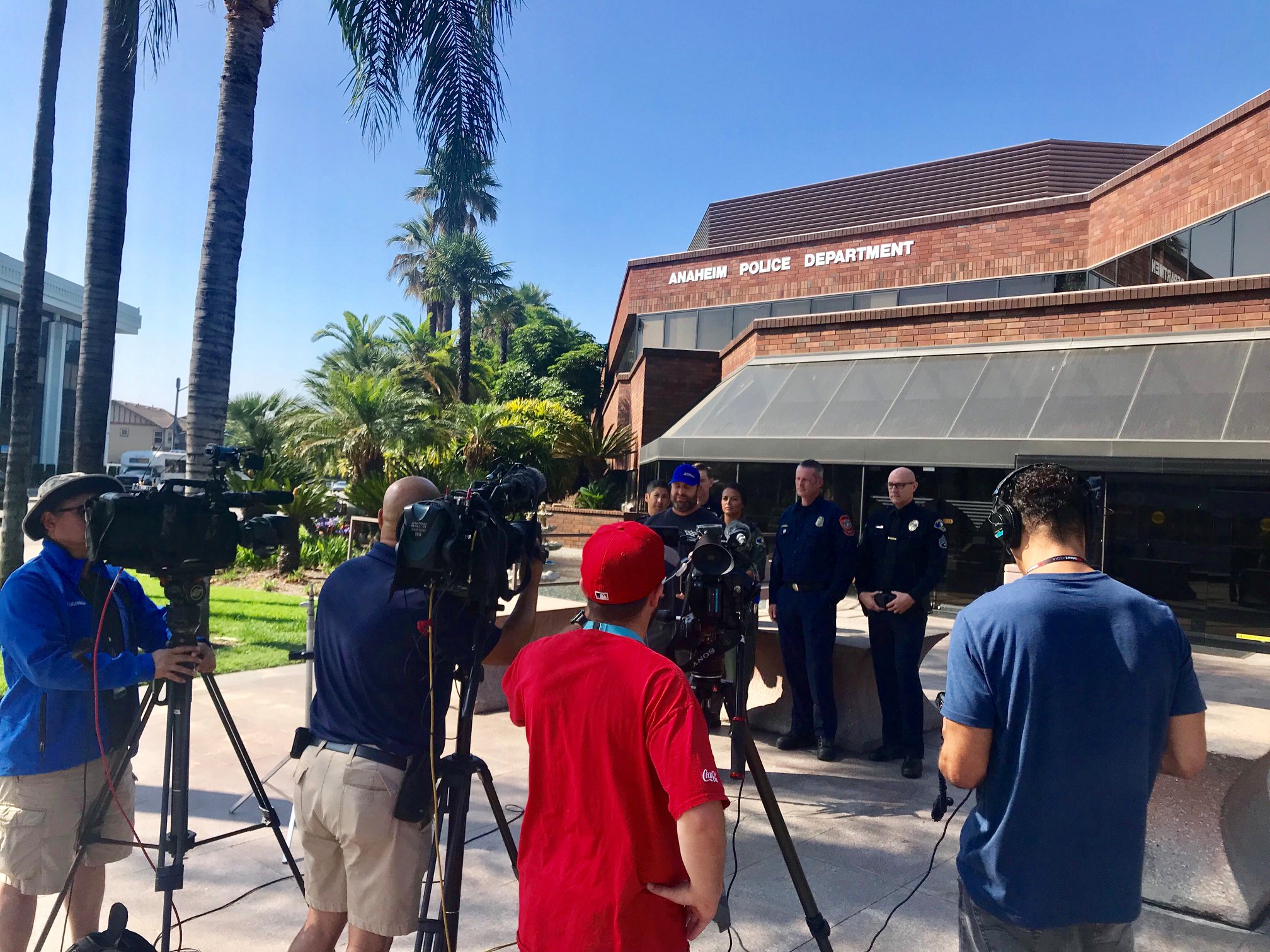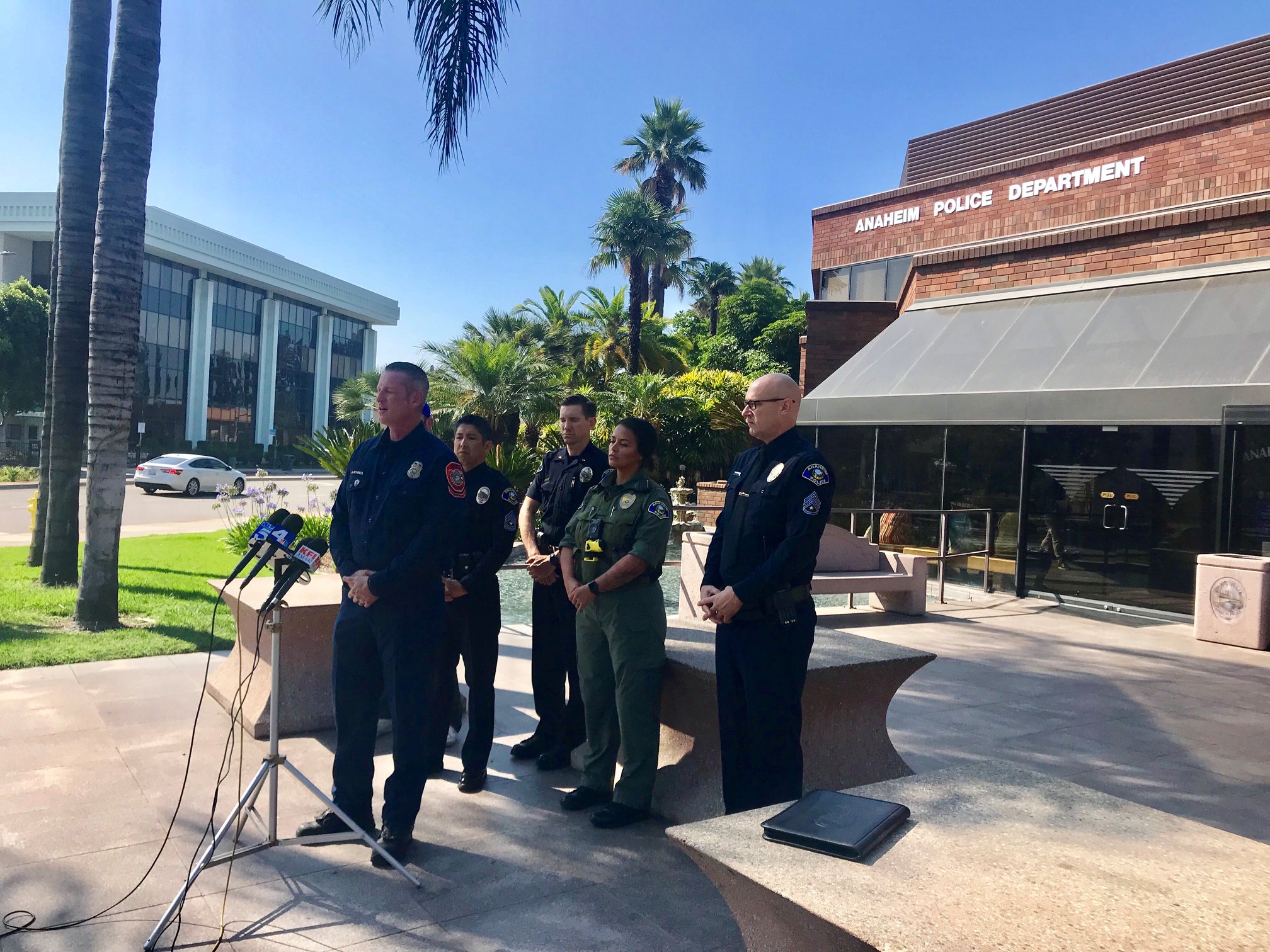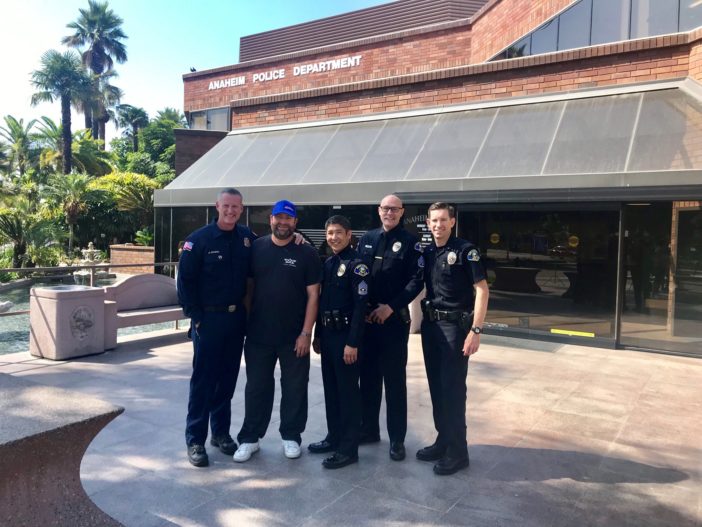Jeff Shepard realizes how long the journey ahead of him is, but his belief in the cause keeps pushing him forward, one visit at a time.
Shepard, who was diagnosed with Post-Traumatic Stress Disorder (PTSD) after he was fired on in 2012 in an ambush while on duty as an Auburn, Wash. police officer, is hitting the road for a cross-country motorcycle ride to bring awareness to other officers with PTSD.
During the third-annual Ride 4 Relief, Shepard rolled up to Anaheim Police Department on July 12, where he and members of the Peer Support Teams of the Anaheim Police Department and Anaheim Fire & Rescue held a news conference to support and bring awareness to the unseen dangers first responders have on the job.
This year, Shepard will stop in 35 states.
“Anaheim Police Department is gracious to have us,” Shepard said. “We wanted to do good things and create this cohesive message across the country and help officers with support programs.”
Using his own experience with PTSD to raise awareness about the struggle many first responders face, Shepard stops at partnering law enforcement departments and fire stations throughout his trip, promoting PTSD awareness and support in each community. When he contacted Anaheim Police Department, Shepard said, they welcomed him and his message.
In 2012, Shepard was diagnosed with PTSD by a department psychologist following the ambush shooting. After a year in therapy, Shepard returned to work as a motorcycle officer, but nearly three years after his critical incident, he and another officer were attacked with an IED (improvised explosive device). That sparked PTSD symptoms that led to Shepard’s medical discharge nearly a year later after a decade as a police officer.
Having been part of the department’s motorcycle unit, Shepard recognized that riding his motorcycle was a therapeutic outlet in fighting issues with PTSD. He developed his first Ride 4 Relief three summers ago in June, which is National PTSD Month.
The nationwide tour of news conferences takes place in police and fire departments and discusses the effort to reduce first responder suicide and increase health and wellness support within the departments across the United States.

Retired police officer and firefighter Jeff Shepard is riding his motorcycle to bring attention to first responders living with PTSD by a series of scheduled press conferences taking place in each city in partnership with police and fire.
Anaheim Police Department Sgt. Darrin Lee knows first hand about the importance of emotional support in law enforcement.
During the news conference, Lee, a 25-year law enforcement veteran who is a coordinator for the Anaheim Police Department Peer Support Team, spoke about the symptoms and causes of PTSD and the supportive resources offered to police officers and firefighters.
During the course of his career, Lee has seen a domestic violence victim bleed out, a man jump from an overpass, looked down a barrel of a gun from a suspect, and several dead bodies.
“What I’ve seen in one day is more than what any person would see in their lifetime, yet society expects first responders to jump back in, remain stoic and fearless,” Lee said during the news conference. “My hope is that the public will see that we are just as vulnerable. With peer support teams and organizations like Ride 4 Relief, we have to give first responders the help they need. PTSD doesn’t have to be a death sentence.”
More police officers die by their own hand than are killed in the line of duty, and first responders die by suicide at a higher rate than people in the general population, according to an April 2018 report by The Ruderman Family Foundation, a philanthropic institution.
Blue H.E.L.P., a Massachusetts-based nonprofit run by active and retired police officers, compiled and released data showing that at least 159 officers took their own lives in 2018 – the same number of suicide fatalities the organization tracked in 2017, and 19 more than in 2016.
The suicides include 151 men and eight women. The average age was 41, with an average length of service of 15 years.
Four states – California, Florida, New York and Texas – had the highest number of officer suicides, with each state reporting at least 10 fatalities in 2018.
“Over the course of years, this narrative continued over and over again with the same outcome,” Lee said. “We’d sit, talk and say retrospectively, ‘We saw that coming.’”
Seven years ago, Lee joined the APD’s Peer Support Team, where 25 members offer support and comfort with stressful situations that occur with the job.
The voluntary positions are filled by both sworn and civilian professional staff, including records specialists, civilian investigators, forensics specialists, communications officers, police officers, sergeants and lieutenants.
Peer supporters make themselves available to any member of the agency during times of personal or professional crisis, Lee said, and anyone using the service can say anything about an issue and be confident that trust, anonymity, and privacy will be maintained.

Matt Fiorenza, a firefighter and paramedic with Anaheim Fire & Rescue, spoke about the importance of raising awareness to help first responders affected by PTSD.
Matt Fiorenza, a firefighter and paramedic with Anaheim Fire & Rescue, echoed Lee’s words, and shared his personal experience with PTSD.
Ten years into his job, Fiorenza started struggling, and after a suicide attempt, he checked into meditative equine therapy.
“PTSD is actually a brain injury,” Fiorenza said. “We give men and women a safe place to rehabilitate and have healthy resources.”
Shepard and APD officials said the partnership helps first responders know they are supported and that efforts are being made to keep them strong in an emotionally stressful environment.
“A healthy officer – mind, body and spirit – is a more dedicated police officer serving the community,” Lee said.
 Behind the Badge
Behind the Badge



